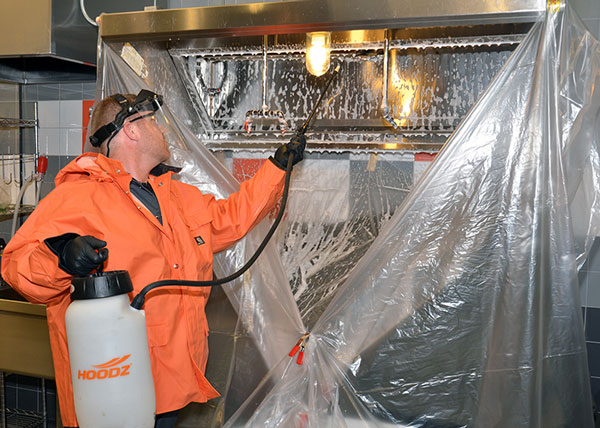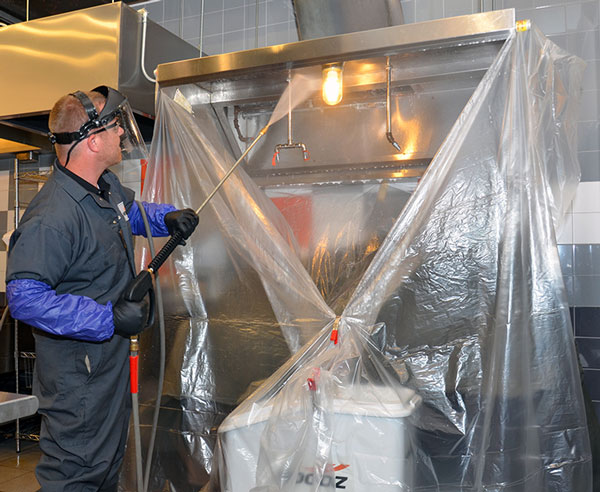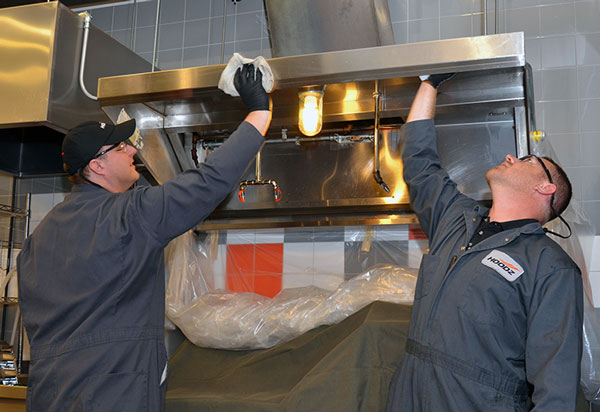The bustle of a commercial kitchen often means business is good for a catering company, but it may also mean regular cleaning and maintenance around the kitchen is neglected. The National Fire Protection Association (NFPA) estimates that an average of 7,410 structure fires occur every year in eating and drinking establishments, resulting in $165 million in property damage.
Maintaining a clean, up-to-code kitchen is an essential part of running a safe and successful business. Having a kitchen cleaned regularly and thoroughly will ensure staff is working under sanitary conditions, the risk of fire is reduced, and the likelihood of failing an unannounced kitchen inspection is eliminated.
One of the most important areas of the kitchen to have cleaned routinely is the exhaust system. Commercial kitchen fires often start from grease buildup on cooking equipment and quickly flare up into the exhaust system where it can reach areas of a building that are not protected by sprinklers. To reduce the risk and severity of grease duct fires and to increase safety, the International Fire Code requires exhaust hood systems in commercial kitchens be cleaned thoroughly.

It is important to understand that the exhaust system cannot be effectively cleaned by kitchen staff. While staff can clean the visible areas of the exhaust fan and hood, it is required that a professional be hired to give the system a complete clean on a regular basis. The frequency of the cleaning depends on the type and quantity of cooking done in the establishment.
---
“An incomplete cleaning can reduce the life of kitchen appliances, create poor indoor air quality, and provide fuel in the event of a kitchen fire. It also carries many hidden costs.”
---
When choosing a vendor to conduct the cleaning of the kitchen exhaust system, a kitchen manager should carefully consider the quality of the service they will receive. It’s important to choose a vendor that is current with local codes, and in compliance with the International Kitchen Exhaust Cleaning Association (IKECA)’s ANSI C10 standard. Adding to the existing International Fire Code, the IKECA C10 standard focuses on ensuring the proper methodology is followed for inspecting kitchen exhaust systems. IKECA, an international non-profit trade organization that promotes kitchen exhaust cleaning to a higher standard, created this standard as a guide for the most widely accepted processes and procedures for cleaning kitchen exhaust systems. The IKECA ANSI C10 Standard was accepted into the International Fire Code and as such provides the only recognized methodology for the cleaning of kitchen exhaust systems.
Lower level of service?
It can be tempting to hire an inexpensive vendor who does not take the standard into consideration, but this lower level of service can almost guarantee an insufficient cleaning will be conducted. An incomplete cleaning can reduce the life of kitchen appliances, create poor indoor air quality, and provide fuel in the event of a kitchen fire. It also carries many hidden costs. Heating, cooling, and even the refrigeration systems for walk-in and reach-in coolers will waste energy and run inefficiently when the kitchen exhaust system is not properly cleaned and maintained. These hidden costs of poor quality cleaning add up to major loss of resources for a catering establishment.

All commercial kitchen managers should make themselves familiar with the IKECA standard before hiring a vendor. When interviewing a potential vendor, kitchen managers should make sure the vendor is aware of the standard and will provide top quality service that is in line with the standard’s requirements. Kitchen managers should also be suspicious of a vendor that claims to offer a cleaning service that is in line with the IKECA standard yet is significantly less expensive than competitors. Complying with the IKECA standard often means the service will come at a premium cost, but it’s an extra cost that will make all the difference when protecting the safety of a commercial kitchen.
Also note: if a kitchen is shared by multiple catering companies, this rotating staff might easily be unaware of the level of grease building up in the exhaust system over time. Keep in mind that even in kitchens where high grease producing appliances are not present, a hazard still exists. Flour from baking, for example, can collect in the duct system and has the potential to ignite.

It’s important to keep the IKECA ANSI C10 standard in mind when selecting a kitchen exhaust system cleaning vendor. Kitchen managers should not settle for a lower quality vendor that is not in compliance with this standard. Doing so will put their kitchen at risk for fire, property damage and unnecessary fees from a failed kitchen inspection.
Jack Grace is a Senior Business Implementation Specialist for HOODZ International, a recognized leader in the commercial kitchen exhaust system cleaning and preventive maintenance industry. He is also a past president of the International Kitchen Exhaust Cleaning Association. HOODZ is well regarded for delivering quality kitchen cleaning, code compliance, and fire prevention solutions to restaurants, institutions, and other food service industries. HOODZ’s highly trained professionals adhere to the National Fire Protection Association (NFPA) Standard-96, which is devoted exclusively to the ventilation control and fire protection of commercial cooking operations. For more information, visit www.hoodzinternational.com or contact 1-888-514-6639.




